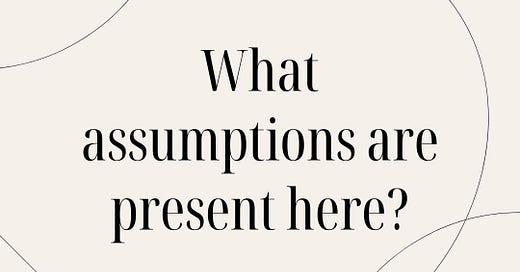The Coaching Question
“What assumptions are present here?”
When to Use This Question
When a teacher or leader is making a decision based on incomplete or biased information.
When resistance to change is rooted in unchallenged beliefs rather than evidence.
When navigating conflict between colleagues, teams, or leadership.
When unpacking instructional decisions that may be based on outdated practices or personal biases.
The Problem This Question Aims to Solve
Educators and leaders often act based on assumptions they aren’t fully aware of. These assumptions shape decision-making, interpersonal relationships, and instructional strategies—sometimes in ways that are unhelpful or even harmful. By surfacing and questioning assumptions, we create space for deeper thinking, better decision-making, and more inclusive leadership.
The Research Behind It
Chris Argyris’ Ladder of Inference presented in Peter Senge’s The Fifth Discipline (1994) – People quickly jump to conclusions based on assumptions rather than objective data. This question helps slow that process down and challenge premature conclusions.
Daniel Kahneman’s Thinking, Fast and Slow (2013) – Fast thinking (System 1) often relies on heuristics and assumptions that may be incorrect. Asking this question forces a shift to slower, more deliberate reasoning (System 2).
Implicit Bias Research (i.e. Banaji & Greenwald, 2013, Galvan & Payne, 2024) – Many assumptions are shaped by unconscious biases. By identifying these, educators and leaders can make more equitable and effective decisions.
Example Application in Coaching
Scenario: A teacher assumes that students who don’t ask questions during class are not interested in the material.
Coach: What assumptions are present here?
Teacher: I guess I assumed that asking questions equals engagement. Maybe some students process things internally or don’t feel comfortable speaking up.
Next Steps: The coach could help the teacher explore alternative ways of engaging students, like using exit tickets, small group discussions, or providing quiet reflection time, and encourage regular check-ins to understand students’ needs and learning preferences.
Additional Questions to Deepen the Conversation
“What would change if this assumption were false?”
“What evidence do you have to support or challenge this assumption?”
“How might someone with a different perspective view this situation?”
Final Reflection for Coaches and Leaders
Assumptions are an inevitable part of how we process information, but unchecked assumptions can limit learning, relationships, and decision-making. We must challenge others to think critically, challenge biases, and create more thoughtful and effective solutions.







